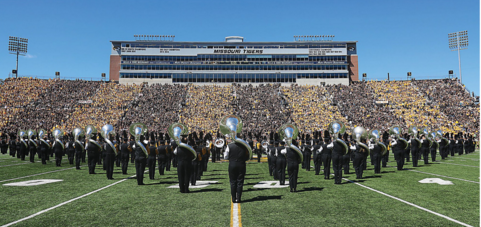Marching Mizzou

COLUMBIA — Fuller Lyon, now in his third year as assistant director of Marching Mizzou, has been with the Southeastern Conference in some fashion for 20 years.
He began his undergraduate work in 1995 as a music performance major at the University of Tennessee.
He then switched majors and earned his bachelor's and master's degrees in sports management. He continued to be involved as a tuba player in the top concert band and was a drum major during Tennessee's national championship run in 1998.
In 2010, he earned a master's degree in conducting at Louisiana State University and then completed the coursework for his doctorate there. While writing his dissertation, MU hired him in 2013. Here's a look at Homecoming from his perspective.
Q. What does it mean to you to be a marching band director in the SEC?
A. I love it. Half my life is centered around sports, as well, because of my background. It's a way to be connected to athletics and still support it in a way that I'm not an athletic director or coach.
I understand the game management side; both (director) Brad Snow and I are huge sports fans. We can talk to you all day about this stuff. He and I really understand the games and how to flip momentum around and utilize the crowd in a positive way.
Q. As far as the Homecoming game itself, does the band have a different attitude going into that?
A. It's amazing to me how much the community — not just the Mizzou community, but Columbia and the state of Missouri — kind of rally around that one particular week and how important it is to this particular university.
It's also amazing for me to see a parade route and there are, I don't know, 50,000 people on the parade route, and maybe it's 7:30 in the morning. That's just crazy. That's awesome. Coming from New Orleans, it reminds me of Mardi Gras. That's kind of an incredible gesture from the citizens to what we are, what we represent here at Mizzou.
During the game, we're usually limited to two minutes of halftime. So we only do one song on the field, and then we form the 'MU,' and then they do the wreaths with the homecoming court.
The alumni band comes back, which is always great. We have, you know, alumni who are from 22, 23 years old to probably well into their 70s, and it's pretty amazing to see the generation gap and the different styles of playing.
Especially marching — if you watch the alumni band, you can see how the band has evolved through the decades from how they marched 50 years ago to how they currently march.
That's one of those things that a lot of people probably don't notice — watching the marching technique of a lot of different alumni members.
Q. You play the fight song. What do you think that means to all the alums coming back?
A. One thing we all learn as we get older is that things change. And then we kind of hold onto things that remain the same throughout time. That's one of the things that regardless of how old you are — the different generations out there — that song symbolizes Mizzou.
Two songs, really — "Every True Son" and "Fight Tiger." We have that added chant in between. It's kind of our identity. It's a great time to hear when the announcer says, "Every True Son" and "Fight Tiger" because that's his trademark — Brandt Crocker, our PA announcer.
Everyone stands up and cheers and does the chant with us. It's really kind of a special moment for the entire stadium and the entire Mizzou community to come together.
Just about everyone here in Columbia knows those two songs.

